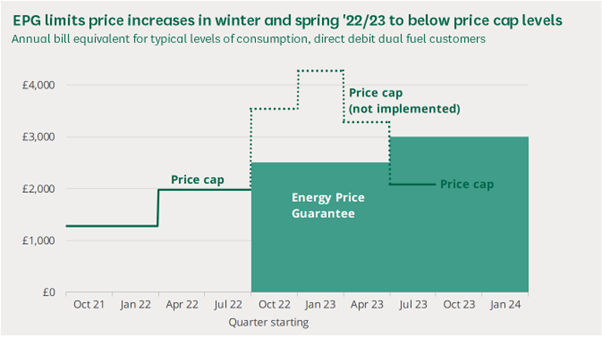You can manage your cookie preferences in the sections below. If you would like to know more, please view our privacy & cookie policy.
Will Energy Prices Ever Go Back Down?
Factors such as rising demand, limited supplies, storage constraints, and the ongoing conflict in Ukraine have all contributed to spiralling energy prices over the last two years. Consumers are now feeling the pressure of rising bills and are understandably asking: "Will energy prices ever go back down?”
In this article, we examine the current situation in the British energy market and look to answer this question.
The Energy Price Guarantee
In response to criticism over an impending 80% rise in energy costs, the UK Government introduced the Energy Price Guarantee (EPG) in October 2022. The objective of the scheme, which is planned to last until late 2024, was to limit the impact on billpayers by capping prices and compensating suppliers.
The EPG sets a cap on units of energy, not annual charges. This means that households that use more fuel will continue to pay more than those who use less.
The OFGEM Price Cap
The Office of Gas and Electricity Markets (OFGEM) is a Government regulator of British energy suppliers. OFGEM applies its own ‘price cap’ on suppliers in the UK, limiting them to a maximum amount they can charge consumers for each kilowatt hour (kWh) of energy used.
While the Government calculates its EPG by unit rates, OFGEM bases its price cap on daily standing charges.
How are the Price Caps Changing?
From 1st July 2023, the Government’s EPG was increased to a higher level, allowing energy suppliers to charge more per unit. However, in the same month, OFGEM lowered their price cap to a £2,074 annual spend, based on the typical consumption for a dual fuel household. The graph below shows the gap between the Government’s EPG and OFGEM’s cap:
Why are Wholesale Prices Falling?
Wholesale energy prices have been falling for several months since they peaked in the summer of 2022. A fairly mild winter combined with climate-conscious and saving-savvy consumers cutting down on energy usage means that demand has dwindled. This allowed the fuel supply to catch up and balance out the wholesale costs.
Another major factor was the UK reducing its dependence on Russian gas by replenishing storage facilities with gas from other sources. Previously, Russia's invasion of Ukraine in early 2022 and the subsequent closure of the Nord Stream pipeline had presented supply challenges that caused demand (and prices) to skyrocket.
Consumers have not yet seen the benefit due to a significant delay in suppliers passing the savings on. The OFGEM price cap reduction in April 2023 was insufficient to bring it below the EPG level, so this didn’t translate to customers’ bills.
Will Energy Prices Ever Go Down?
In July 2023, most customers on standard variable tariffs saw a decrease in their bills as the price cap dropped below the EPG level. Although standing charges remained unchanged, gas unit prices fell by 27%, and electricity unit prices dropped by 9%. The current projection suggests that the cap will decrease to just under £2,000 by October and maintain this level well into the new year.
In conclusion, energy prices will go down and have already started to show a downward trend. This will come as welcome news to many consumers, but it is essential to remember that even these lower prices are a significant increase from 2021 levels. As it stands, there is no sign of energy prices going back to where they were in 2021 just yet.
How Can You Save Money on Your Energy Bills?
With the ongoing uncertainty surrounding the energy market, consumers are increasingly seeking ways to cut their bills. At UKPower, we can help you compare gas and electricity providers to discover the most affordable energy rates, enabling you to switch to a more favourable plan and save on your bills.
Click here to run an energy price comparison, and see if you could be paying less for your gas and electricity.


